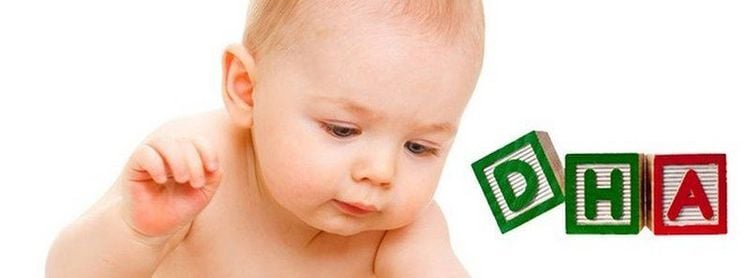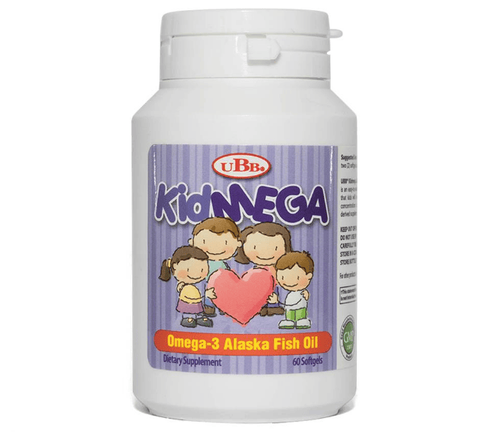This is an automatically translated article.
The article was professionally consulted by Doctor of Pediatrics - Neonatology, Vinmec Central Park International General Hospital.
DHA is essential for the comprehensive development of brain and eye function in children. DHA supplementation early and continuously will bring long-term benefits to children's development, so DHA supplementation is always recommended in children, especially infants and young children.
1. What is DHA?
DHA's full name is DocosaHexaenoic Acid - this is an essential unsaturated fatty acid belonging to the group of Omega-3 fatty acids (unsaturated fatty acids with 22 carbons, 6 double bonds, the first double bond at carbon position 3). . DHA is necessary for brain development, vision, increasing immunity, reducing the risk of developing allergies in young children. These essential unsaturated fatty acids cannot be synthesized by our bodies, but must be obtained from food sources.2. The role of DHA for young children
Supplementing with DHA for babies will help them develop and perfect the vision function, because DHA accounts for a very high percentage in the retina, this is where the total command of the eye's vision. DHA is essential for brain development because DHA accounts for a very high percentage of gray matter to create intelligence in children and create sensitivity of neurons, helping to transmit information quickly and accurately.DHA has a strong relationship with newborn baby's head circumference, weight and length. An adequate supply of this substance can help reduce the incidence of postpartum depression. In utero, the fetus requires a large increase in DHA absorption to match the increased brain DHA intake during pregnancy and in the months following birth. This is proven right at birth, the baby's brain weight is about 70% of the adult brain's weight.

Vai trò của DHA đối với trẻ nhỏ
3. Children's DHA needs
DHA requirements for babies begin from the time they are in the womb. Therefore, when pregnant from about 5 months, the brain and visual organs of the fetus have developed, so it is necessary to provide DHA for the baby right during pregnancy, which means that pregnant women need to eat a lot of food. or drink milk with high DHA content.For premature babies, the need for DHA supplements for babies is higher to help brain and vision develop well. When a baby is born, the need for DHA increases very high, that is the period when the central nervous system develops the most, the need to provide DHA is even more important.
4. How to use DHA for babies
During pregnancy, pregnant women need to supplement with infant formula with a DHA content of about 200mg/day to be able to provide enough DHA for babies right from the womb. Especially in the last 3 months, an average of 1 day fetus needs 2.2g EFAs/day for the development of the nervous system and blood vessels.For premature babies and children under 12 months of age, the DHA requirement for babies at 0.32% of total fatty acids, corresponding to 17mg/100kcal is optimal. The best way to add DHA to your baby is breast milk, so it's important to exclusively breastfeed for the first 6 months of life to ensure enough DHA. If you do not have enough milk, you need to give your baby a nutritional support formula with DHA at the recommended daily dose.
For children from 1 to 6 years old, this is a very necessary period of DHA, because DHA plays an important role in the process of stimulating brain development. In addition, DHA also helps children improve heart health. Therefore, parents should give their children a variety of foods containing DHA so that children can develop in the best way. Children should supplement DHA every day with a concentration of 75mg/day.
Children from 6 years old and above are the time to start learning, the child's brain needs a lot of activity to absorb new knowledge. To enhance memory, information processing ability and high concentration when learning for children. Parents need to regularly supplement the necessary DHA for their children.
Supplementing DHA for children through daily food is the best way. DHA is found in fish oil, fish and seafood. Therefore, you should eat a variety of fish and seafood to get enough DHA for the body.
DHA is also found in many vegetable oils such as coconut oil, corn oil, olive oil, palm oil, peanut oil, rapeseed oil, soybean oil.... In addition, parents can also supplement DHA for children with other functional foods. Or supplement DHA from vitamin gummies to ensure food safety.
Besides DHA, parents should supplement their children with supporting products containing lysine, essential micro-minerals and vitamins such as zinc, chromium, selenium, B vitamins to help fully meet the nutritional needs of children. young. At the same time, these essential vitamins also support digestion, enhance nutrient absorption, help improve anorexia, and help children eat well.
Parents can learn more:
Signs of zinc deficiency in children
Micronutrient deficiency and failure to gain weight in children
Please regularly visit Vinmec.com website and update useful information to take care of your child. Take care of the baby and the whole family.













